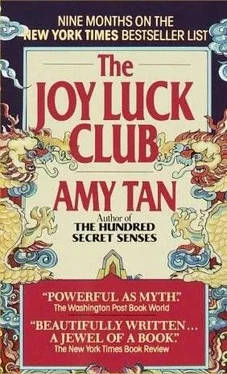
Amy Tan
The Joy Luck Club
The author is grateful to her weekly writers' group for kindness and criticism during the writing of this book. Special thanks also to Louis DeMattei, Robert Foothorap, Gretchen Schields, Amy Hempel, Jennifer Barth, and my family in China and America. And a thousand flowers each to three people whom I have had the joy and the luck to know: my editor, Faith Sale, for her belief in this book; my agent, Sandra Dijkstra, for saving my life; and my teacher, Molly Giles, who told me to start over again and then patiently guided me to the end.
The mothers, and the daughters:
Suyuan Woo-Jing-mei "June" Woo
An-mei Hsu-Rose Hsu Jordan
Lindo Jong-Waverly Jong
Ying-ying St. Clair-Lena St. Clair
Born in 1952 in Oakland, California to Chinese immigrant parents, Amy Tan followed her own path. Over the objections of her mother, she majored in college in writing and linguistics and pursued a career in business writing.
Any Tan's relationship with her mother was very difficult. An opportunity to travel with her mother back to China brought a new perspective.
Amy Tan's first fiction efforts were short stories. These attracted an agent, Sandra Dijkstra, who sold what became The Joy Luck Club to Putnam's. When published in 1986 The Joy Luck Club spent 40 weeks on The New York Times Bestseller list. It was nominated for the National Book Award and the National Book Critics Circle Award and was a recipient of the Commonwealth Gold Award and the Bay Area Book Award. The Joy Luck Club was adapted into a feature film in 1994, for which Amy Tan was a co-screenwriter with Ron Bass and a co-producer with Bass and Wayne Wang.
A stunning literary achievement, The Joy Luck Club explores the tender and tenacious bond between four daughters and their mothers. The daughters know one side of their mothers, but they don't know about their earlier never-spoken of lives in China. The mothers want love and obedience from their daughters, but they don't know the gifts that the daughters keep to themselves. Heartwarming and bittersweet, this is a novel for mother, daughters, and those that love them.
Feathers From a Thousand LI Away
The old woman remembered a swan she had bought many years ago in Shanghai for a foolish sum. This bird, boasted the market vendor, was once a duck that stretched its neck in hopes of becoming a goose, and now look!-it is too beautiful to eat .
Then the woman and the swan sailed across an ocean many thousands of li wide, stretching their necks toward America. On her journey she cooed to the swan: "In America I will have a daughter just like me. But over there nobody will say her worth is measured by the loudness of her husband's belch. Over there nobody will look down on her, because I will make her speak only perfect American English. And over there she will always be too full to swallow any sorrow! She will know my meaning, because I will give her this swan-a creature that became more than what was hoped for ."
But when she arrived in the new country, the immigration officials pulled her swan away from her, leaving the woman fluttering her arms and with only one swan feather for a memory. And then she had to fill out so many forms she forgot why she had come and what she had left behind .
Now the woman was old. And she had a daughter who grew up speaking only English and swallowing more Coca-Cola than sorrow. For a long time now the woman had wanted to give her daughter the single swan feather and tell her, "This feather may look worthless, but it comes from afar and carries with it all my good intentions." And she waited, year after year, for the day she could tell her daughter this in perfect American English .
The Joy Luck Club
Jing-Mei Woo
My father has asked me to be the fourth corner at the Joy Luck Club. I am to replace my mother, whose seat at the mah jong table has been empty since she died two months ago. My father thinks she was killed by her own thoughts.
"She had a new idea inside her head," said my father. "But before it could come out of her mouth, the thought grew too big and burst. It must have been a very bad idea."
The doctor said she died of a cerebral aneurysm. And her friends at the Joy Luck Club said she died just like a rabbit: quickly and with unfinished business left behind. My mother was supposed to host the next meeting of the Joy Luck Club.
The week before she died, she called me, full of pride, full of life: "Auntie Lin cooked red bean soup for Joy Luck. I'm going to cook black sesame-seed soup."
"Don't show off," I said.
"It's not showoff." She said the two soups were almost the same, chabudwo . Or maybe she said butong , not the same thing at all. It was one of those Chinese expressions that means the better half of mixed intentions. I can never remember things I didn't understand in the first place.
My mother started the San Francisco version of the Joy Luck Club in 1949, two years before I was born. This was the year my mother and father left China with one stiff leather trunk filled only with fancy silk dresses. There was no time to pack anything else, my mother had explained to my father after they boarded the boat. Still his hands swam frantically between the slippery silks, looking for his cotton shirts and wool pants.
When they arrived in San Francisco, my father made her hide those shiny clothes. She wore the same brown-checked Chinese dress until the Refugee Welcome Society gave her two hand-me-down dresses, all too large in sizes for American women. The society was composed of a group of white-haired American missionary ladies from the First Chinese Baptist Church. And because of their gifts, my parents could not refuse their invitation to join the church. Nor could they ignore the old ladies' practical advice to improve their English through Bible study class on Wednesday nights and, later, through choir practice on Saturday mornings. This was how my parents met the Hsus, the Jongs, and the St. Clairs. My mother could sense that the women of these families also had unspeakable tragedies they had left behind in China and hopes they couldn't begin to express in their fragile English. Or at least, my mother recognized the numbness in these women's faces. And she saw how quickly their eyes moved when she told them her idea for the Joy Luck Club.
Joy Luck was an idea my mother remembered from the days of her first marriage in Kweilin, before the Japanese came. That's why I think of Joy Luck as her Kweilin story. It was the story she would always tell me when she was bored, when there was nothing to do, when every bowl had been washed and the Formica table had been wiped down twice, when my father sat reading the newspaper and smoking one Pall Mall cigarette after another, a warning not to disturb him. This is when my mother would take out a box of old ski sweaters sent to us by unseen relatives from Vancouver. She would snip the bottom of a sweater and pull out a kinky thread of yarn, anchoring it to a piece of cardboard. And as she began to roll with one sweeping rhythm, she would start her story. Over the years, she told me the same story, except for the ending, which grew darker, casting long shadows into her life, and eventually into mine.
"I dreamed about Kweilin before I ever saw it," my mother began, speaking Chinese. "I dreamed of jagged peaks lining a curving river, with magic moss greening the banks. At the tops of these peaks were white mists. And if you could float down this river and eat the moss for food, you would be strong enough to climb the peak. If you slipped, you would only fall into a bed of soft moss and laugh. And once you reached the top, you would be able to see everything and feel such happiness it would be enough to never have worries in your life ever again.
Читать дальше













